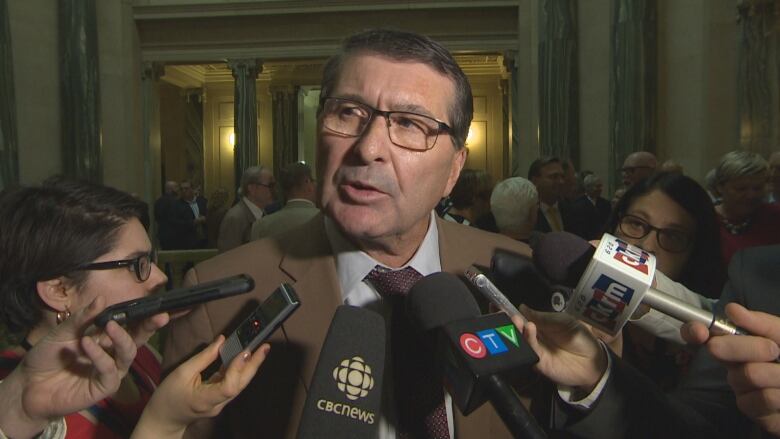Sask. throne speech promises new trespassing legislation, commercial driver training
NDP leader says speech lacks new ideas

The Saskatchewan government's to-do list for the next year includes introducing new trespassing legislation, allowing for more policing in rural areas and changing commercial driver training.
These priorities were among those highlighted in the throne speech Wednesday afternoon, delivered by Lieutenant Governor W. Thomas Molloy, which opened the fall sitting of the Saskatchewan legislature.
Premier Scott Moe plans to introduce legislation on trespassing laws "to better address the balance between members of the public and the rights of rural landowners." He said Wednesday specific details would be released in due time.
The government recently held public consultations where it asked, "Should Saskatchewan legislation provide that all access by members of the public to rural property requires the prior express permission of the rural land owner or occupier regardless of the activity and failure to secure that consent constitutes an offence?"

Ray Orb, president of the Saskatchewan Association of Rural Municipalities, believes the province needs to strengthen its trespassing laws, including levying stiffer fines and penalties.
"We don't believe that rural people should have to post their land for 'no trespassing' or 'no hunting.' We believe that those rural people have rights, have privacy," he said.
At least seven of the 18 highlights listed in the throne speech are directed at those living in rural Saskatchewan. Moe was questioned on what's in his plan for cities.
"The investment that we have provided to all Saskatchewan communities, or many Saskatchewan communities — urban, rural, rural smaller towns and villages across the province — is indicative of where we've been and where we're going," Moe said, pointing to the construction of the Regina Bypass and investment in schools in Warman, Martensville and Saskatoon.

NDP says Sask. Party is out of ideas
NDP Leader Ryan Meili said the speech lacks a vision for the province. The opposition pointed out that 12 of the 18 highlights in the speech were initiatives already in the works or had been previously announced.
"I think they've run out of steam and run out of ideas and that popularity was largely based on coming in with a new vision and saying, you know, 'We're a different province, we've got new things to do,' and they've run out of those ideas," said Meili.
He added that despite the focus on rural crime, the speech makes no mention of crystal meth, which is a concern for many in the province.
Meili also said it was "really striking" to see no mention of education.

Saskatchewan Teachers' Federation president Patrick Maze said he was disappointed.
"There's a consistent message out there that teachers are feeling that the demands in the classroom are just too much."
Everything is on the table to deal with crime, Moe says
Combating rural crime was another major theme in the speech. One of the Moe government's priorities is to amend the Police Act to allow communities with populations under 500 people to join regional police forces.
"We are looking currently at joining existing police forces in areas where we can. We'll be able to regionalize the efforts that we have," said Moe.
"When it comes to how we deal with, how we address crime in our province and in our communities, everything's on the table and we're going to look at all options."
He wouldn't answer which police forces are being eyed and said additional funding would be "part of the conversation," but provided no commitment beyond that.
The government also intends to change legislation to make it easier to seize property "if it has been acquired through unlawful activities," improve training for commercial drivers and spend more money on making intersections around the province safer. Highways has conducted a preliminary review of more than 900 intersections and dedicated $700,000 this year to "clearing sight lines and improving intersection safety".
Clare's Law
Moe's government says it plans to "become the first province in Canada with Clare's Law," which would allow police to disclose information in order to better address domestic violence.
The speech also said the government plans to offer victims of sexual violence 10 unpaid days of leave, which is currently offered to those who experience interpersonal violence.
Expanding parental leave from 37 to 63 weeks and adding an extra week of maternity leave are also listed in the government's plan.
Commercial driver training coming
Saskatchewan Government Insurance previously said some kind of standardized training course would be implemented for truck drivers in 2019.
It says the change was already in the works before 16 people died and 13 more were injured when a bus carrying the Humboldt Broncos junior hockey team collided with a semi trailer on April 6.
Sixties Scoop apology
Moe said the government also plans to make good on its promise to deliver a balanced budget for the 2019-20 fiscal year and for Moe to deliver an apology to survivors of the Sixties Scoop. Both promises were made under his predecessor, Brad Wall.
Moe said there are no hard dates for when the apology would happen, but it would be "as soon as possible."
As expected, Moe committed to continue fighting Ottawa on its plan to levy a price or a tax on carbon in 2019.
Read the full text of the speech here:
(PDF KB)
(Text KB)CBC is not responsible for 3rd party content

